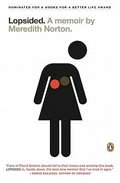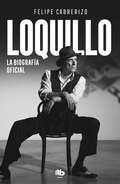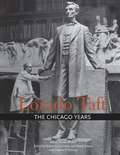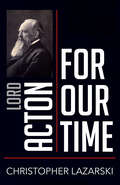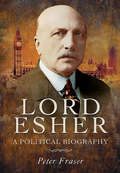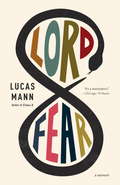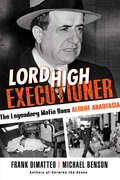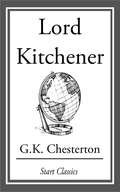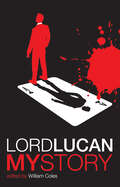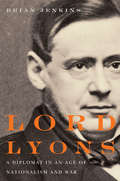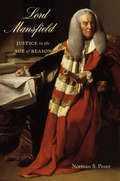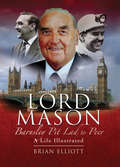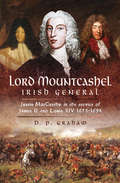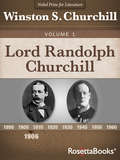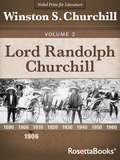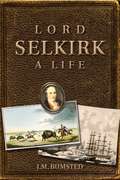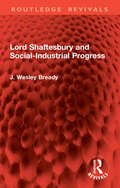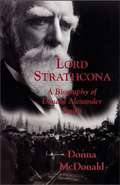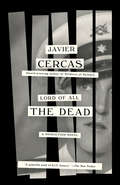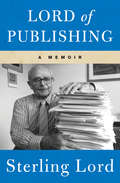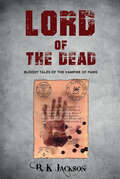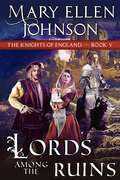- Table View
- List View
Lopsided
by Meredith Norton'As far as I'm concerned, Lance Armstrong and I are close to exact opposites, both physically and mentally . . . If surviving this particularly deadly form of breast cancer required any of the Lance-like traits, such as a willingness to physically exert myself, I was as good as dead. 'When well-meaning family and friends found out about her diagnosis, they often came armed with copies of Lance Armstrong's cancer survival book. Meredith reacted by penning a sharp, irreverent and laugh-out-loud funny memoir. More than just an account of her harrowing and, at times, hilarious treatments during her illness, Lopsided offers up entertaining memories of an offbeat life. A fiesty and irreverent memoir about life and death, family and friends, and everything in between.
Loquillo: La biografía oficial
by Felipe CabrerizoLa biografía oficial y definitiva de Loquillo, basada en materiales de archivo y entrevistas inéditas a su protagonista. Figura polémica y esquiva, Loquillo alcanzó el éxito en compañía de Intocables y Trogloditas pero, incómodo ante un personaje que había dejado de ser el suyo, no dudó en abandonarlo. Fue el inicio de una larga travesía en la que muchas veces estuvo cerca de perder el pie y de la que solo consiguió salir tras reinventarse como artista en solitario. Casi medio siglo después de su debut en un cabaret de las Ramblas, el Loco afronta una de las etapas más plenas de su carrera convertido en un referente para la cultura español y rehuyendo cualquier asomo de conformismo. Un recorrido largo y sinuoso analizado minuciosamente en este volumen, primera biografía del cantante. Escrita con gran ritmo por el reconocido periodista musical Felipe Cabrerizo, que ha entrevistado al protagonista y su círculo, la historia acaba capturando no solo una figura, sino toda una época de nuestra cultura. Sobre la biografía y el biografiado:«Loquillo nunca está dónde se le busca. Es Batman en la baticueva, Dino con los amigos, un tipo listo en los negocios y una estrella en el escenario, en el cancionero y en el imaginario de este país. Y Cabrerizo ha tenido la osadía de tomarle las hechuras con pasión y rigor a nuestro roquero de guardia, superviviente de todas las batallas».Carlos Zanón «El Loco es un tipo excéntrico que no hace concesiones. Desenfunda las palabras y las dispara con una lucidez que a veces da hasta miedo. Es un personaje de western. Se lo puede permitir. Porque él no es un cantante. Es un artista. Una estrella del Rock and Roll con cicatrices, historias que contar y un enorme talento para hacerlo a su manera. Un grande dentro y fuera del escenario, capaz de todo: incluso de romperse con un verso».Marta Robles «El Loco es un animal salvaje en peligro de extinción. Este libro es lo más cerca que va a estar de reproducirse encima de un escenario».Manuel Jabois «De Loquillo conocemos su épica. Sus hombros firmes, su mandíbula apretada. Sus frases de epitafio. Pero en este libro se adentra en terra incognita. Desvela el espíritu aún intacto del hijo único que leía a Dickens después de meterse en peleas de barrio. Del adolescente que sigue contando emocionado, como el que lanza una canasta perfecta, su paseo en un Bentley con Johnny Hallyday por los Campos Eliseos. Loquillo es todos esos. Valiente, leal, arrogante y libre. Loquillo es el gran romántico, en el sentido más alemán y menos manido del término».Silvia Grijalba «Loquillo es un Jack London de la aventura musical, un caballero andante del rock, un paladín del honor y de la amistad».Luis Alberto de Cuenca
Lorado Taft: The Chicago Years
by Henry Adams Robert G. La France Allen Stuart WellerSculptor Lorado Taft helped build Chicago's worldwide reputation as the epicenter of the City Beautiful Movement. In this new biography, art historian Allen Stuart Weller picks up where his earlier book Lorado in Paris left off, drawing on the sculptor's papers to generate a fascinating account of the most productive and influential years of Taft's long career. Returning to Chicago from France, Taft established a bustling studio and began a twenty-one-year career as an instructor at the Art Institute, succeeded by three decades as head of the Midway Studios at the University of Chicago. This triumphant era included: ephemeral sculpture for the 1893 World's Columbian Exposition; a prolific turn-of-the-century period marked by the gold-medal-winning The Solitude of the Soul; the 1913 Fountain of the Great Lakes; the 1929 Alma Mater at the University of Illinois; and large-scale projects such as his ambitious program for Chicago's Midway with the monumental Fountain of Time. In addition, the book charts Taft's mentoring of women artists, including the so-called White Rabbits at the World's Fair, many of whom went on to achieve artistic success. Lavishly illustrated with color images of Taft's most celebrated works, Lorado Taft: The Chicago Years completes the first major study of a great American artist.
Lord Acton for Our Time (People for Our Time)
by Christopher LazarskiLord Acton for Our Time illuminates the thought of the English historian, politician, and writer who gave us the famous maxim: "Power tends to corrupt, and absolute power corrupts absolutely." Extracting lessons for our current age, Christopher Lazarski focuses on liberty—how Acton understood it, what he thought was its foundation and necessary ingredients, and the history of its development in Western Civilization. Acton is known as a historian, or even the historian, of liberty and as an ardent liberal, but there is confusion as to how he understood liberty and what kind of liberalism he professed. Lord Acton for Our Time provides an introduction that presents essentials about Acton's life and recovers his theory of liberalism. Lazarski analyzes Acton's type of liberalism, probing whether it can offer a solution to the crisis of liberal democracy in our own era. For Acton, liberty is the freedom to do what we ought to do, both as individuals and as citizens, and his writings contain valuable lessons for today.
Lord Esher: A Political Biography
by Peter FraserAlthough wielding huge influence in late Victorian and Edwardian political life, Reginald Baliol Brett (1852 1930), the second Lord Esher was, an enigma to his contemporaries and still remains a puzzle to historians.At the heart of British and Imperial political affairs for several decades, Esher sat in both Houses of Parliament, was a high ranking civil servant, friend and confidential advisor to three Sovereigns and four Prime Ministers (of differing political hues) and yet refused high office offered by both Liberals and Conservatives. Yet his behind-the-scenes influence through his range of friends in high places gave him unmatched, some thought undemocratic, power. Despite his lack of military service he was instrumental through his work on the Committee for Imperial Defence (CID) and its Secretarial for the wholesale reorganisation of the Armed Forces. It could be said that Esher, with his grasp of power without responsibility, was a unique phenomenon in British history.The Author, while compiling this fascinating study, drew on Cabinet and CID files, the Royal Archives and the papers of the Esher, Balfour, Asquith and Lloyd George estates. The result is a brilliant readable yet scholarly addition to British political bibliography.
Lord Fear
by Lucas MannLucas Mann was only thirteen years old when his brother Josh--charismatic and ambitious, funny and sadistic, violent and vulnerable--died of a heroin overdose. Although his brief life is ultimately unknowable, Josh is both a presence and an absence in the author's life that will not remain unclaimed. As Josh's story is told in kaleidoscopic shards of memories assembled from interviews with his friends and family, as well as from the raw material of his journals, a revealing, startling portrait unfolds. At the same time, Mann pulls back to examine his own complicated feelings and motives for recovering memories of his brother's life, searching for a balance between the tension of inevitability and the what ifs that beg to be asked. Through his investigation, Mann also comes to redefine his own place in a family whose narrative is bisected by the tragic loss. Unstinting in its honesty, captivating in its form, and profound in its conclusions, Lord Fear more than confirms the promise of Mann's earlier book, Class A; with it, he is poised to enter the ranks of the best young writers of his generation.From the Hardcover edition.
Lord High Executioner: The Legendary Mafia Boss Albert Anastasia
by Michael Benson Frank Dimatteo Sr.The bloodsoaked saga of the Murder, Inc. legend who helped create the modern American Mafia—one body at a time—featuring shocking eyewitness accounts... Umberto &“Albert&” Anastasia was born in Italy at the turn of the century. Five decades later, he would be gunned down in a barber shop in New York City. What happened in the years in between—and why every crime family had reason to want him dead—is one of the most brutal and fascinating stories in the history of American organized crime. This in-depth account of the man who became one of the most powerful and homicidal crime bosses of the twentieth century from Mafia insider Frank Dimatteo is the first full-length book to chronicle Anastasia&’s bloody rise from fresh-off-the-boat immigrant to founder of the notorious killer&’s club Murder, Inc.—featuring never-before-told accounts from those who feared him most... They called him &“The One Man Army.&” &“Mad Hatter.&” &“Lord High Executioner.&” Albert Anastasia came to America mean and became a prolific killer. His merciless assassination of Mafia godfather Vincent Mangano is recounted here in chilling first-hand detail. He set the record: the first man in the history of American justice to be charged with four separate murders—and walk free after each one. But in the end, he was the last obstacle in rival Mafia hoodlum Vito Genovese&’s dream of becoming the boss of bosses—and paid the ultimate price . . .
Lord Kitchener
by G. K. ChestertonHoratio Herbert Kitchener was Irish by birth but English by extraction, being born in County Kerry, the son of an English colonel. The fanciful might see in this first and accidental fact the presence of this simple and practical man amid the more mystical western problems and dreams which were very distant from his mind, an element which clings to all his career and gives it an unconscious poetry. He had many qualities of the epic hero, and especially this -- that he was the last man in the world to be the epic poet. There is something almost provocative to superstition in the way in which he stands at every turn as the symbol of the special trials and the modern transfiguration of England; from this moment when he was born among the peasants of Ireland to the moment when he died upon the sea, seeking at the other end of the world the other great peasant civilisation of Russia. Yet at each of these symbolic moments he is, if not as unconscious as a symbol, then as silent as a symbol; he is speechless and supremely significant, like an ensign or a flag. The superficial picturesqueness of his life, at least, lies very much in this -- that he was like a hero condemned by fate to act an allegory.
Lord Lucan: My Story
by William ColesThe British Lord who became a legendary fugitive tells his story of murder and escape in this fictionalized account of the infamous scandal.On November 7th, 1974, a murder plot goes disastrously wrong. John Bingham, 7th Earl of Lucan, had intended to do away with his wife. Instead, it is their nanny, Sandra Rivett, who lies dead in the basement of their London home. The following day, Lord Lucan disappeared. And despite a global hunt, he was never seen again.Bingham had once been the most charismatic members of the British peerage. A frequent gambler, he was known as Lucky Lord Lucan—even though his losses often exceeded his winnings. Since his disappearance, he has become a legend of a very different sort. Here, in his own hand, is Lord Lucan&’s confession to his grizzly crimes, and the story of his mysterious life. It is a strange tale of an Old Etonian Earl on the run; of how a man became a murderer; and how a life-long friendship soured into an enduring hate. Here, for the first time, is the full monstrous account of the life of Lord Lucan.
Lord Lyons
by Brian JenkinsThe British ambassador in Washington during the US Civil War and ambassador in Paris before and after the Franco-Prussian war, Lord Lyons (1817-1887) was one of the most important diplomats of the Victorian period. Although frequently featured in histories of the United States and Europe in the second half of the nineteenth century, and in discussions and analyses of British foreign policy, he has remained an ill-defined figure. In Lord Lyons: A Diplomat in an Age of Nationalism and War, Brian Jenkins explains the man and examines his career. Based on a staggering study of primary sources, he presents a convincing portrait of a subject who rarely revealed himself personally. Though he avoided publicity, Lyons came to be regarded as his nation's premier diplomat as his career took him to the heart of the great international issues and crises of his generation. As minister to the United States he played a vital role in preserving Anglo-American peace and was a powerful voice opposing Anglo-French intervention in the Civil War. While ambassador to the Ottoman Empire, he helped to prevent French control of the Suez Canal then under construction. In France, he maintained an amiable and constructive relationship with a bitter nation struggling to reorganize itself and its constitution after the Franco-Prussian War. For many historians Lord Lyons has been difficult to ignore but hard to admire. In rescuing him as a truly important historical figure, Jenkins details for the first time the personal and public strategies Lyons employed through decades of exemplary diplomatic service on both sides of the Atlantic.
Lord Lyons: A Diplomat in an Age of Nationalism and War
by Brian JenkinsThe British ambassador in Washington during the US Civil War and ambassador in Paris before and after the Franco-Prussian war, Lord Lyons (1817-1887) was one of the most important diplomats of the Victorian period. Although frequently featured in histories of the United States and Europe in the second half of the nineteenth century, and in discussions and analyses of British foreign policy, he has remained an ill-defined figure. In Lord Lyons: A Diplomat in an Age of Nationalism and War, Brian Jenkins explains the man and examines his career. Based on a staggering study of primary sources, he presents a convincing portrait of a subject who rarely revealed himself personally. Though he avoided publicity, Lyons came to be regarded as his nation's premier diplomat as his career took him to the heart of the great international issues and crises of his generation. As minister to the United States he played a vital role in preserving Anglo-American peace and was a powerful voice opposing Anglo-French intervention in the Civil War. While ambassador to the Ottoman Empire, he helped to prevent French control of the Suez Canal then under construction. In France, he maintained an amiable and constructive relationship with a bitter nation struggling to reorganize itself and its constitution after the Franco-Prussian War. For many historians Lord Lyons has been difficult to ignore but hard to admire. In rescuing him as a truly important historical figure, Jenkins details for the first time the personal and public strategies Lyons employed through decades of exemplary diplomatic service on both sides of the Atlantic.
Lord Mansfield
by Norman PoserIn the first modern biography of Lord Mansfield (1705-1793), Norman Poser details the turbulent political life of eighteenth-century Britain's most powerful judge, serving as chief justice for an unprecedented thirty-two years. His legal decisions launched England on the path to abolishing slavery and the slave trade, modernized commercial law in ways that helped establish Britain as the world's leading industrial and trading nation, and his vigorous opposition to the American colonists stoked Revolutionary fires. Although his father and brother were Jacobite rebels loyal to the deposed King James II, Mansfield was able to rise through English society to become a member of its ruling aristocracy and a confidential advisor to two kings. Poser sets Mansfield's rulings in historical context while delving into Mansfield's circle, which included poets (Alexander Pope described him as "his country's pride"), artists, actors, clergymen, noblemen and women, and politicians. Still celebrated for his application of common sense and moral values to the formal and complicated English common law system, Mansfield brought a practical and humanistic approach to the law. His decisions continue to influence the legal systems of Canada, Britain, and the United States to an extent unmatched by any judge of the past. An illuminating account of one of the greatest legal minds, Lord Mansfield presents a vibrant look at Britain's Age of Reason through one of its central figures.
Lord Mansfield: Justice in the Age of Reason
by Norman S. PoserIn the first modern biography of Lord Mansfield (1705-1793), Norman Poser details the turbulent political life of eighteenth-century Britain's most powerful judge, serving as chief justice for an unprecedented thirty-two years. His legal decisions launched England on the path to abolishing slavery and the slave trade, modernized commercial law in ways that helped establish Britain as the world's leading industrial and trading nation, and his vigorous opposition to the American colonists stoked Revolutionary fires. Although his father and brother were Jacobite rebels loyal to the deposed King James II, Mansfield was able to rise through English society to become a member of its ruling aristocracy and a confidential advisor to two kings. Poser sets Mansfield's rulings in historical context while delving into Mansfield's circle, which included poets (Alexander Pope described him as "his country's pride"), artists, actors, clergymen, noblemen and women, and politicians. Still celebrated for his application of common sense and moral values to the formal and complicated English common law system, Mansfield brought a practical and humanistic approach to the law. His decisions continue to influence the legal systems of Canada, Britain, and the United States to an extent unmatched by any judge of the past. An illuminating account of one of the greatest legal minds, Lord Mansfield presents a vibrant look at Britain's Age of Reason through one of its central figures.
Lord Mason, Barnsley Pitlad to Peer: A Life Illustrated
by Brian ElliottRoy Mason swapped the colliery for Westminster when elected MP for Barnsley in 1953. He went on to become one of the leading figures in the Labour Party during the 1960s and 1970s, holding a number of prestigious offices including Defence Secretary from 1974 and Secretary of State for Northern Ireland from 1976. This photographic biography presents images from Mason's own archive charting his personal and political life from the Yorkshire pits to the House of Lords.
Lord Mountcashel: Justin MacCarthy in the Service of James II and Louis XIV, 1673–1694
by D. P. GrahamJustin MacCarthy (later Lord Mountcashel) was born into a notable family of Irish Jacobites, loyal to the exiled Stuarts, and grew up in France. Their Irish land was regained after the Restoration of Charles II but Justin, as the youngest surviving son, sought a career in the French army (as both his father and oldest brother had done). In 1673 he joined an Irish regiment in French service. He served under the legendary French marshals Turenne and Conde against the Dutch and their Imperial allies and by 1676 was commanding the regiment. He became part of the personal circle of the Catholic Duke of York, the future James II and, after the latters accession in 1685, Justin helped to transform the Irish army into a Catholic one.When James II was deposed in the Glorious Revolution of 1688 and fled via France to Ireland, Justin was one of the most experienced commanders resisting Williams invasion. Unfortunately MacCarthy was defeated at the Battle of Newtownbutler (1689), wounded and captured. He escaped and again went into exile in France, where he was the first commander of the famous Irish Brigade until his death in 1694.
Lord Randolph Churchill Volume 1 (Lord Randolph Churchill #1)
by Winston S. ChurchillThe first volume of the Nobel Prize-winning Prime Minister&’s biography of his father, the fiery Conservative Party leader of late Victorian Britain. In 1906, Sir Winston Churchill produced a two-volume biography of his father Lord Randolph Churchill, the 19th century Member of Parliament whose political career ended in scandal. This first volume deals with early events in Randolph&’s life, including his upbringing, his education, and his election to the House of Commons as the Conservative MP for Woodstock. This volume also recount&’s Randolph&’s quarrel with the Prince of Wales in a daring gambit to protect the integrity of the Churchill family name. This episode resulted in Churchill&’s temporary exile from British high society, a prequel to his later disgrace. While Winston Churchill is clearly a supporter of his father&’s, he is not afraid to be honest about the mistakes and failures of his career and personal life.
Lord Randolph Churchill Volume 2 (Lord Randolph Churchill #2)
by Winston S. ChurchillThe second volume of the Nobel Prize-winning Prime Minister&’s biography of his father, the controversial Victorian era British MP. In 1906, Sir Winston Churchill produced a two-volume biography of his father Lord Randolph Churchill, the 19th century Member of Parliament whose political career ended in scandal. This second volume detail&’s the elder Churchill&’s emergence as an independent leader who challenged the old guard of his own Conservative Party. As an obscure and overlooked backbench MP, Randolph established a cohort of Tory rebels known as the &“fourth party.&” Though excluded from British high society, he nevertheless made a name for himself and rose to become Chancellor of the Exchequer. But as he was on course to run for Prime Minister, his confrontational style led to a career-ending blunder.
Lord Selkirk: A Life
by J.M. BumstedThomas Douglas, the Fifth Earl of Selkirk (1770–1820), was a complex man of his times, whose passions left an indelible mark on Canadian history. A product of the Scottish Enlightenment and witness to the French Revolution, he dedicated his fortune and energy to the vision of a new colony at the centre of North America. His final legacy, the Red River Settlement, led to the eventual end of the dominance of the fur trade and began the demographic and social transformation of western Canada. The product of three decades of research, this is the definitive biography of Lord Selkirk. Bumsted’s passionate prose and thoughtful analysis illuminate not only the man, but also the political and economic realities of the British empire at the turn of the nineteenth century. He analyzes Selkirk’s position within these realities, showing how his paternalistic attitudes informed his “social experiments” in colonization and translated into unpredictable, and often tragic, outcomes. Bumsted also provides extensive detail on the complexities of colonization, the Scottish Enlightenment, Scottish peerage, the fur trade, the Red River settlement, and early British-Canadian politics.
Lord Shaftesbury and Social-Industrial Progress (Routledge Revivals)
by J. Wesley BreadyOriginally published in 1926, this volume is much more than a biography of an outstanding politician, social reformer and philosopher. It provides an analysis of the history of social conditions in England during the nineteenth century, as well as a discussion of the development of social affairs and the inertia of political psychology. The role that faith and religion played in motivating Lord Shaftesbury’s desire for social reform is also discussed as is the ways in which he and John Wesley transformed the social and ethical ideas of England to enshrine in law many of the working conditions that we take for granted today such as defined hours of work and rest periods.
Lord Strathcona: A Biography of Donald Alexander Smith
by Donna McdonaldDonald Smith, known to most Canadians as Lord Strathcona, was an adventurer who made his fortune building railroads. He joined the Hudson’s Bay Company at age eighteen and went on to build the first railway to open the Canadian Northwest to settlement. As his crowning achievement, he drove the last spike for the nation-building Canadian Pacific Railway. In 1896, Smith became Canada’s High Commissioner in London and was soon elevated to the peerage. He became a generous benefactor to Canadian institutions. This eminently readable biography brings to light new information, including details about Strathcona’s personal life and his scandalous marriage.
Lord of All the Dead: A nonfiction novel
by Javier CercasFrom the internationally renowned author of The Impostor, a courageous journey into his own family history and that of a country collapsing from a fratricidal war--his most moving, most personal book, one he has spent his entire life preparing to write.Javier Cercas grew up hearing the legend of his adored great-uncle Manuel Mena, who died at nineteen in the bloodiest battle of the Spanish Civil War--while fighting for Franco's army. Who was this young man? A fascist hero whose memory is an embarrassment or a committed idealist who happened to fall on the wrong side of history? Is it possible to be a moral person defending an immoral cause? Through visits back to his parents' village in southern Spain, interviews with survivors, and research into the murkiest corners of the war, the author pieces together the life of this enigmatic figure and of an entire generation. This sui generis work combines intimate family history, investigative scholarship, personal confession, war stories, and road trips, finally becoming a transcendent portrait of a country's indelible scars--a book about heroism, death, the persistence of the past, and the meaning of an individual life against the tapestry of history.
Lord of Publishing: A Memoir
by Sterling LordA frank and insightful memoir of a life spent in publishing, by one of literature&’s most legendary agentsSterling Lord has led an extraordinary life, from his youth in small-town Iowa to his post-war founding and editing of an English-language magazine in Paris, followed by his move to New York City to become one of the most powerful literary agents in the field. As agent to Jack Kerouac, Ken Kesey, and countless others—ranging from Jimmy Breslin and Rocky Graziano to the Berenstains and four US cabinet members—Lord is the decisive influence and authors&’ confidant who has engineered some of the most important book deals in literary history. In Lord of Publishing, his memoir of life and work (and tennis), Lord reveals that he is also a consummate storyteller. Witty and wise, he brings to life what was arguably the greatest era of book publishing, and gives a brilliant insider&’s scoop on the key figures of the book business—as well as some of the most remarkable books and authors of our time.
Lord of the Dead: Bloody Tales of the Vampire of Paris
by B K JacksonIn an age where the story of murder is told of perpetrators who are generally behind bars, by the families of the victims of crime, or by the authorities who have prosecuted killers, here is a story told from a different perspective. This is the story of Nicolas Claux, a self-confessed Vampire and Cannibal who, having been convicted of murder in the 1990’s in France, and has since been subsequently released from prison. This is the story of his life, from his own words and detailed recollections, told in a manner unlike any other. This is an insight into the life and mind of a killer.
Lord, I Want to Be Whole
by Stormie O'MartianBriefly describes the author's difficult childhood and the choices that led her into a destructive lifestyle that eventually left her empty and alone, then presents seven steps for living the Christian life in obedience to God. Includes a discussion of how to release the past, confess sins before God, seek deliverance from past bondage, and stand strong in freedom from pain. Offers ways to seek emotional, physical, and spiritual wholeness following abuse or trauma.
Lords Among the Ruins: A Medieval Romance (The Knights of England Series #5)
by Mary Ellen JohnsonAs the Fourteenth-Century Closes, So Does the Rule of England's Most Tyrannical Monarch in the Medieval Historical, LORDS AMONG THE RUINS, by Mary Ellen JohnsonMedieval England from the Aftermath of 1381 Peasants’ Revolt to the Deposition and Murder of Richard II on 14 Feb 1400As the former boy king, Richard II, approaches his third decade, Matthew Hart and England’s other great lords struggle to deflect his more destructive impulses, which increasingly threaten the kingdom.Amidst attempted assassinations, growing civil war and political intrigue, Matthew Hart, his beloved wife, Margery Watson, and their offspring live and love and war their way through the last years of the fourteenth century, seeing the deposition and murder of England’s most tyrannical monarch.Publisher's Note: Readers with a passion for history will appreciate the author's penchant for detail and accuracy. In keeping with the era, this story contains scenes of brutality which are true to the time and man's timeless inhumanity. There are a limited number of sexual scenes and NO use of modern vulgarity.From the Author: There is nothing new under the sun. If we seek to understand today’s events, history will always provide the answer. By 1398 the megalomaniacal Richard II had consolidated his power, executed or banished all his enemies and destroyed all those who might speak out in opposition to him. Two years later Richard was deposed, thrown into a dungeon in Pontefract Castle and starved to death. Lessons: We can never predict the future; actions always have unintended consequences; we sow the seeds of our own destruction and payback’s a bitch!THE KNIGHTS OF ENGLAND, in series orderThe Lion and the LeopardA Knight There WasWithin A Forest DarkA Child Upon The ThroneLords Among the Ruins
